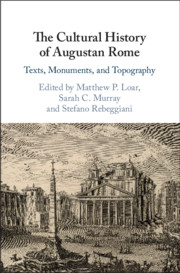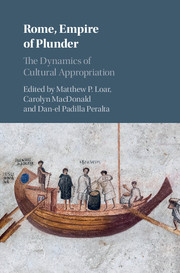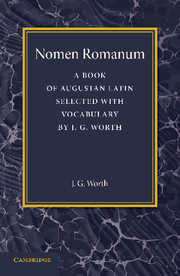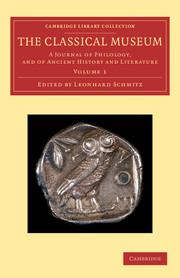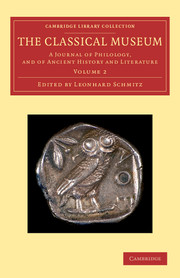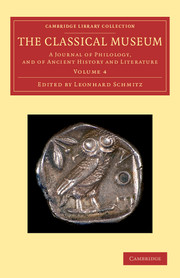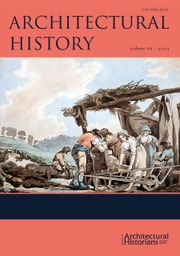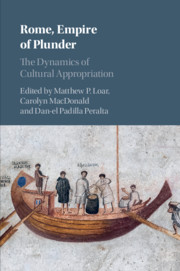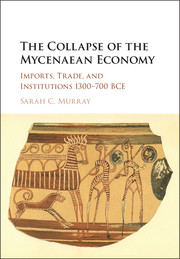The Cultural History of Augustan Rome
Texts, Monuments, and Topography
- Editors:
- Matthew P. Loar, University of Nebraska, Lincoln
- Sarah C. Murray, University of Toronto
- Stefano Rebeggiani, University of Southern California
- Date Published: March 2023
- availability: Not yet published - available from November 2024
- format: Paperback
- isbn: 9781108727792
Paperback
Other available formats:
Hardback, eBook
Looking for an inspection copy?
This title is not currently available for inspection. However, if you are interested in the title for your course we can consider offering an inspection copy. To register your interest please contact [email protected] providing details of the course you are teaching.
-
This volume wades into the fertile waters of Augustan Rome and the interrelationship of its literature, monuments, and urban landscape. It focused on a pair of questions: how can we productively probe the myriad points of contact between textual and material evidence to write viable cultural histories of the ancient Greek and Roman worlds, and what are the limits of these kinds of analysis? The studies gathered here range from monumental absences to monumental texts, from canonical Roman authors such as Cicero, Livy, and Ovid to iconic Roman monuments such as the Rostra, Pantheon, and Solar Meridian of Augustus. Each chapter examines what the texts in, on, and about the city tell us about how the ancients thought about, interacted with, and responded to their urban-monumental landscape. The result is a volume whose methodological and heuristic techniques will be compelling and useful for all scholars of the ancient Mediterranean world.
Read more- Includes cutting-edge research on the city of Rome and the interrelationship of its literature, monuments, and urban landscape
- Demonstrates interdisciplinary approaches to Roman culture and history, making use of different methodologies
- Explores the advantages and limitations of bringing literary and material evidence into dialogue with each other
Reviews & endorsements
'… the volume is well produced, with a solid general index … graduate students and scholars of Augustan Rome, as well as those working at the interstices of texts and monuments, will find many worthwhile individual pieces and points of provocation to chew on in this collection.' Evan Jewell, Bryn Mawr Classical Review
Customer reviews
Not yet reviewed
Be the first to review
Review was not posted due to profanity
×Product details
- Date Published: March 2023
- format: Paperback
- isbn: 9781108727792
- length: 206 pages
- dimensions: 229 x 152 x 11 mm
- weight: 0.309kg
- availability: Not yet published - available from November 2024
Table of Contents
Introduction Matthew P. Loar, Sarah C. Murray and Stefano Rebeggiani
1. Monumental insignificance: the rhetoric of Roman topography from Livy's Rome D. S. Levene
2. Cicero, quid in alieno saeculo tibi? The 'republican' rostra between Caesar and Augustus Thomas Biggs
3. The Julian Calendar and the Solar Meridian of Augustus: making Rome run on time Peter Heslin
4. Monument men: buildings, inscriptions, and lexicographers in the creation of Augustan Rome Dan-el Padilla Peralta
5. The Porticus Liviae in Ovid's Fasti (6.637–648), Part I: things
Part II: words Maddalena Bassani and Francesca Romana Berno
6. Greek poets on the Palatine: a wild cow chase? Carolyn MacDonald
7. Ovid's two-body problem Stephanie Ann Frampton.
Sorry, this resource is locked
Please register or sign in to request access. If you are having problems accessing these resources please email [email protected]
Register Sign in» Proceed
You are now leaving the Cambridge University Press website. Your eBook purchase and download will be completed by our partner www.ebooks.com. Please see the permission section of the www.ebooks.com catalogue page for details of the print & copy limits on our eBooks.
Continue ×Are you sure you want to delete your account?
This cannot be undone.
Thank you for your feedback which will help us improve our service.
If you requested a response, we will make sure to get back to you shortly.
×
